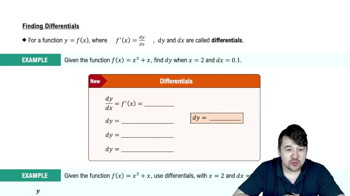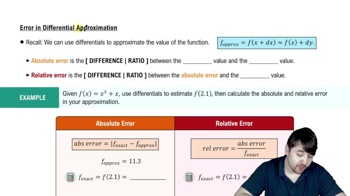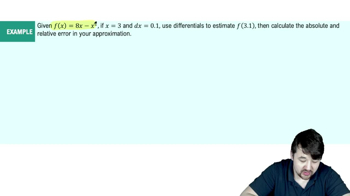Table of contents
- 0. Functions7h 52m
- Introduction to Functions16m
- Piecewise Functions10m
- Properties of Functions9m
- Common Functions1h 8m
- Transformations5m
- Combining Functions27m
- Exponent rules32m
- Exponential Functions28m
- Logarithmic Functions24m
- Properties of Logarithms34m
- Exponential & Logarithmic Equations35m
- Introduction to Trigonometric Functions38m
- Graphs of Trigonometric Functions44m
- Trigonometric Identities47m
- Inverse Trigonometric Functions48m
- 1. Limits and Continuity2h 2m
- 2. Intro to Derivatives1h 33m
- 3. Techniques of Differentiation3h 18m
- 4. Applications of Derivatives2h 38m
- 5. Graphical Applications of Derivatives6h 2m
- 6. Derivatives of Inverse, Exponential, & Logarithmic Functions2h 37m
- 7. Antiderivatives & Indefinite Integrals1h 26m
- 8. Definite Integrals3h 25m
4. Applications of Derivatives
Differentials
Problem 4.7.25
Textbook Question
Evaluate the following limits. Use l’Hôpital’s Rule when it is convenient and applicable.
lim_x→ e (ln x - 1) / (x - 1)
 Verified step by step guidance
Verified step by step guidance1
Identify the limit to evaluate: lim_{x→e} (ln x - 1) / (x - 1).
Substitute x = e into the expression to check if it results in an indeterminate form (0/0 or ∞/∞).
Since ln(e) = 1, the numerator becomes 0 and the denominator becomes e - 1, confirming the indeterminate form 0/0.
Apply l'Hôpital's Rule, which states that if the limit results in an indeterminate form, you can take the derivative of the numerator and the derivative of the denominator.
Differentiate the numerator (d/dx(ln x) = 1/x) and the denominator (d/dx(x - 1) = 1), then re-evaluate the limit.
Recommended similar problem, with video answer:
 Verified Solution
Verified SolutionThis video solution was recommended by our tutors as helpful for the problem above
Video duration:
8mPlay a video:
Was this helpful?







